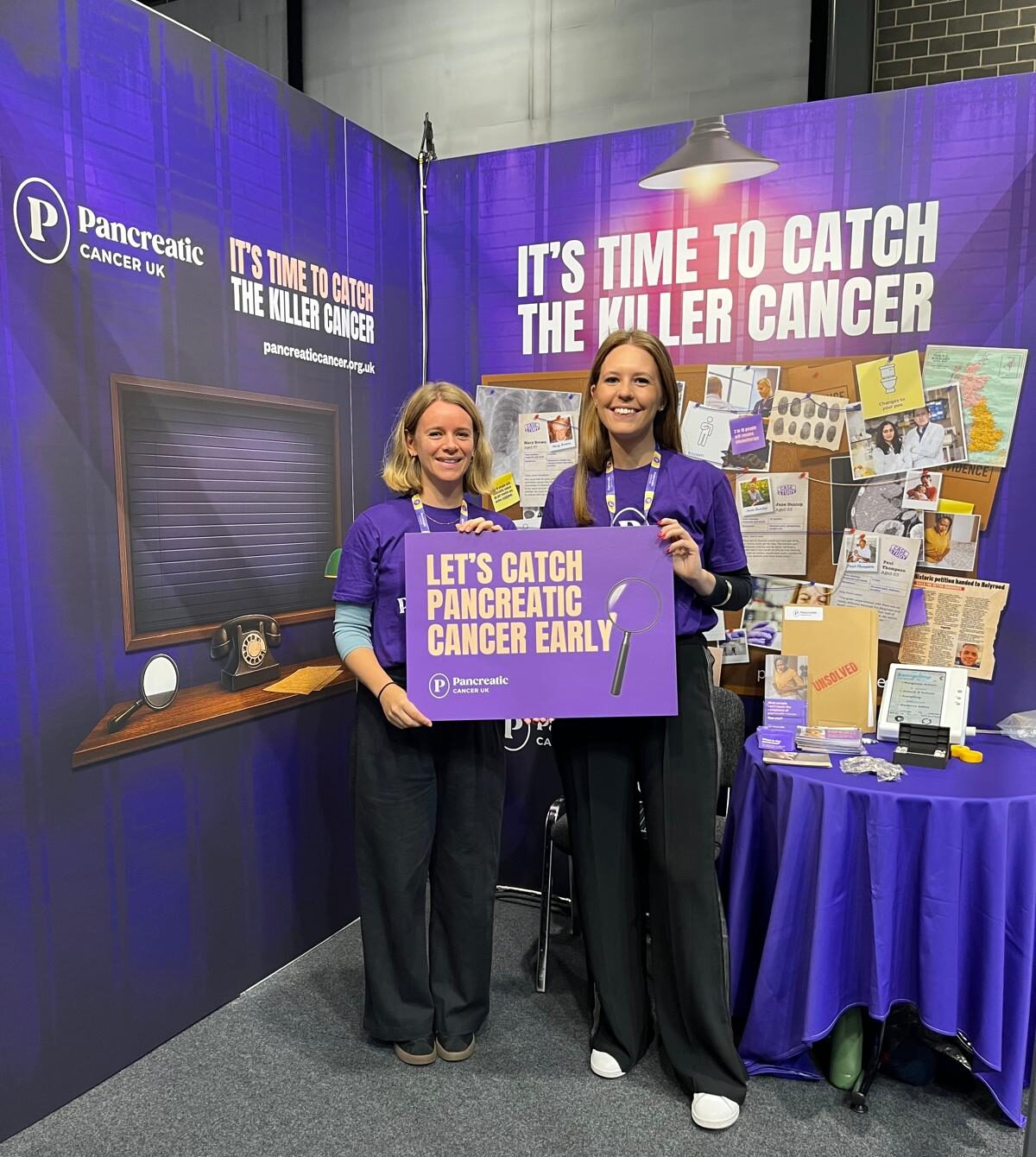
Dietetic management and pancreatic cancer
Wednesday 3rd December 2025, 9.00am – 12.00pm via Zoom Webinar
Join us for our free, annual educational event on dietetic management in pancreatic cancer.
Specialist dietitians will share their knowledge and expertise on nutritional assessment and nutritional management, including a spotlight session on pancreatic exocrine insufficiency (PEI) and the use of pancreatic enzyme replacement therapy (PERT).
We’ll hear directly from someone with lived experience, as well as sharing case studies and practical tips throughout to bring the theory to life and help you as health professionals provide the best support to your patients.

Agenda
- 09.00 – 09.05: Welcome and introduction – Jeni Jones, Pancreatic Cancer Specialist Nurse, Pancreatic Cancer UK
- 09.05 – 09.15: Lived experience video
- 09.15 – 09.35: Overview of nutritional assessment – Isabelle March, Dietitian, Morriston Hospital, Swansea Bay University Health board
- 09.35 – 10.15: Pancreatic exocrine insufficiency (PEI) and pancreatic enzyme replacement therapy (PERT) – speaker to be confirmed
- 10.15 – 10.25: Break
- 10.25 – 11.15: Nutritional management – Lauren Roberts, HPB Lead Oncology Dietitian, The Clatterbridge Centre
- 11:15 – 11.50: Q&A
- 11.50 – 12.00: Summary of key messages and close – Jeni Jones, Pancreatic Cancer Specialist Nurse, Pancreatic Cancer UK
What will each of these sessions cover?
Overview of nutritional assessment:
- An overview of the pancreas and its endocrine and exocrine function
- Introducing cachexia, sarcopenia, malnutrition and frailty
- Malabsorption and how this impacts on cachexia, sarcopenia, malnutrition and frailty
- Factors affecting nutritional status
- How to assess nutritional status
Pancreatic exocrine insufficiency (PEI) and pancreatic enzyme replacement therapy (PERT):
- PEI – Causes, consequences, symptoms and diagnosis
- PERT – What it does, who needs it, how to take it effectively, titrating the dose and enteral feeding; troubleshooting and differential diagnosis; and supporting patients during the PERT shortages
Nutritional management:
- Managing appetite loss
- Diet fortification and oral nutritional supplements
- Stent dietary advice
- Surgery – including pre- and post-surgery
- Chemotherapy
- Small intestinal bacterial overgrowth (SIBO)
- Bile acid malabsorption (BAM) / Bile acid diarrhoea (BAD)
- Dumping syndrome
- Introduction type 3c diabetes and how it impacts on nutrition
Who is this session for?
This session is suitable for all healthcare professionals treating and supporting people with pancreatic cancer. It is particularly relevant for dietitians and nursing roles, including student dietitians and nurses.
Our speakers
Chair:
- Jeni Jones, Pancreatic Cancer Specialist Nurse, Pancreatic Cancer UK
Speakers:
- Isabelle March, Dietitian, Morriston Hospital, Swansea Bay University Health board
- Lauren Roberts, HPB Lead Oncology Dietitian, The Clatterbridge Centre
Which ACCEND Capabilities in Practice does this course support?
Our events are mapped to the ACCEND framework. Find out more about ACCEND.
This event supports the following ACCEND Capabilities in Practice:
- 6. 1 Provide information and advice appropriate to the needs, priorities and concerns of individuals
- 7. 4 Access information from a range of resources, and use them to meet the individual needs of service users, translating clinically related topics into language which is understandable both for individuals to self-manage effectively and for the development of patient information
- 17. 5 Promote the importance of a healthy diet and nutritional requirements to reduce the impact of cancer-related symptoms
- 18. 1 Recognise common symptoms and oncological emergencies
- 18. 2 Assess and recognise treatment-related and disease related symptoms relevant to own area of practice screen for all these symptoms
- 19. 4 Provide specialist interventions and advice to support symptom management including complex symptoms arising from cancer, cancer treatment and late effects
- 20. 6 Identify the need for additional clinical and professional support such as referral, second opinion
- 24. 2 Engage in self-directed learning, critically reflecting on practice to maximise advanced clinical skills and knowledge, as well as own potential to lead and develop both care and services locally and regionally.
FAQs
What platform will this event be hosted on?
This event will be held on Zoom Webinar. After you book, you will receive an email via Zoom with the joining details. You can join on a computer, laptop, tablet or smartphone – any device with an internet connection.
If you don’t have access to the internet, you can also dial in from a standard telephone.
If you have any additional access needs or special requirements for attending this event, please get in touch with us by emailing hpnetwork@pancreaticcancer.org.uk so we can discuss these with you.
Will I receive a certificate of attendance?
Everyone who joins the event live on the day will get access to their certificate of attendance upon filling in the feedback form. Certificates are only available to live attendees.
Will the event be recorded?
Yes – where the speakers are happy to be recorded. After the event, we will email all registrants with a link to the recordings and presentation slides. So if you’re unable to join the live session, you will be able to catch up at a later date. For the best experience, we recommend joining live.
How do I register?
All you need to do is click the link below and fill in the Zoom registration form. You’ll then receive an automatic email via Zoom with the joining details.
If you have any questions, please don’t hesitate to get in touch with us at hpnetwork@pancreaticcancer.org.uk


Learning and development

Return to the health professional hub
Latest news

29 October 2025
Pancreatic cancer breath test trial involving thousands of patients launches
A world-first breath test for pancreatic cancer will be trialled nationally on thousands of patients with an unknown diagnosis.

10 October 2025
Pancreatic Cancer UK at Labour Party Conference 2025
It’s the start of September and that can only mean one thing in politics – Parliament is back, and we’re ready for another action-packed term.

18 September 2025
Our impact so far on the early detection of pancreatic cancer
Early detection saves lives. Currently, over 80% of people with pancreatic cancer are diagnosed too late to receive potentially life-saving treatment....
